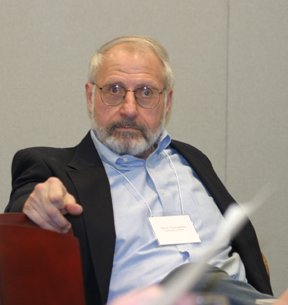 Ernie Pascarella |
Working with Charlie Blaich, director of inquiries at the Center, Pascarella’s team posed the question, "Were there significant differences in outcomes among the students who attended liberal arts colleges?"
Pascarella had never before found evidence that the type of institution could make a difference in educational outcomes. And, of course, there’s a common notion that students who attend liberal arts colleges tend to arrive with higher test scores and an appreciation of learning.
Pascarella ran the data. He carefully controlled for the differences in entering SAT scores, essentially leveling the playing field for all of the students in the survey. And he found what he thought he would: the improved educational outcomes for students at liberal arts colleges, once the controls were in place, were not statistically significant.
Blaich then worked with Pascarella to develop a continuous scale of liberal arts education—variables for the type of education received not institution type. "We created a measure that was based on what colleges actually do, not what they call themselves," says Blaich.
The research team came up with a formula of variables, which they called the "Liberal Arts Emphasis," or essentially the good teaching and learning practices often found at liberal arts colleges. They based the variables on commonly held research, and again had Pascarella perform the data run. Pascarella took his huge data sample, again controlled for ability of the students, and threw in Blaich’s "Liberal Arts Emphasis" variables.
The Eureka moment finally arrived. And the results created quite a buzz at the Center of Inquiry last week.
What Pascarella and Blaich found was that there are significantly stronger educational outcomes for students who pursue a liberal arts experience, which Pascarella rightly points out can be found at large universities and small colleges, but more often at liberal arts college. "What we found matters most is whether the institution has a liberal arts emphasis and whether the student pursues it," said Pascarella.
The results for students of color and students with lower average ability were even more pronounced in places where the liberal arts was emphasized.
So, what does it all mean? Pascarella told me that he thought the data run would be "a bust" and that he was excited that there are significant effects for students who pursue a liberal arts experience.
One researcher asked, "But how do we determine which schools do this better than others?"
Answering her question was harder than it should have been since George Kuh was in the room. Kuh heads up the National Survey of Student Engagement at Indiana University, and his team has spent the last five years identifying colleges and universities that most engage their students, where best practices are in use.
What’s clear to me is that there finally is evidence that a liberal arts/best practices approach leads to better learning outcomes, so families ought to be asking the same types of questions that Kuh and his NSSE survey ask when considering colleges and universities.
As Blaich told me, "Families should look carefully at institutions, and we’re going to try to identify the things they should look for. NSSE will be helpful, but they need to do other things as well. The research is important to the Center because it will direct the conversation that we’ll now begin with high school counselors, parents, teachers, and students."
The Center of Inquiry was founded to serve as a catalyst in the liberal arts. By bringing together people like Pascarella and Kuh, and by focusing on clear and relevant data, the Center appears to have hit its stride. The beneficiaries of this good work will be future generations of college students who will make more informed college choices and thus get a better education.
For more information see: